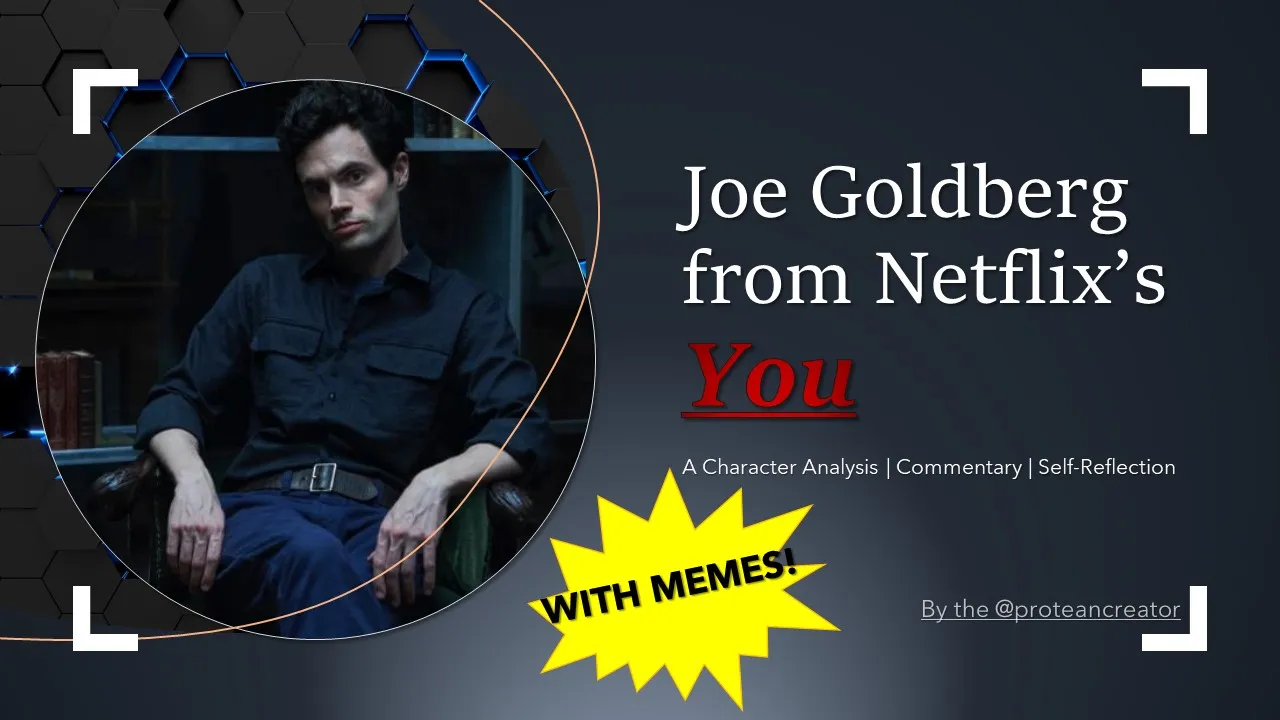
It finally happened!!
I just couldn’t help myself and had been itching to write about this character after finishing the two seasons. I did not really plan on writing this piece. I was about to let my urges to write go, and just save my all my “character nerding” on my personal journal but my boyfriend dared me to write my personal analysis on Joe Goldberg in this platform, after he also finished watching You. He probably sensed the writer in me needing a bit of validation and provided it. That’s a real man right there ya’ll.
I would like to mention that this post sprung out from a place of passion. I just really need to let out all my repressed urges to write about this so that I can get this out of my system and move on. This piece is based solely on what I know and how much I know about analyzing characters and making commentaries. The series is based on Caroline Kepneng’s works, You and Hidden Bodies, but this analysis would just be based on the first two seasons of the Netflix series alone since I haven’t read these books yet.
Before anything else, if you haven’t seen Netflix’s YOU and is planning to, I NEED YOU TO STOP RIGHT HERE because there are major spoilers in the next paragraphs to come. I strongly insist that you watch the series’ first before you continue to save you the pain of knowing things ahead. You don’t have to give yourself unnecessary pain, do you hear me?
Now go and ask your aunt to borrow her Netflix account, and come back when you’re done.
Who is Joe Goldberg?
Let’s begin by describing Joe Goldberg. Who is he and what does he do? Joe Goldberg is a bookstore manager in Mooney’s, owned by his foster father. He is played by Penn Badgley and I honestly could not think of anyone better to play this role.
The story is carried out from Joe’s perspective, with his thoughts being narrated as the story takes place. He is generally well above average in the physical attraction scale. His passion for books, apparent in season one is something he and his foster father share. It was once mentioned in the series that helping people get the “perfect” book was the best part of his job. This makes him even more charming as any male protagonist can get (at least under my list of preferences). He also displays a certain compassion for problematic minors throughout the whole series.
However, there is this one complication about him though – he is a serial killer.
What lengths would you go through for love?
is the question pegged by the series, and apparently, Joe is willing to obsess, stalk, kidnap, steal, burglarize, severely hurt and kill people for it.
There are a lot of speculations made by fans especially those with clinical mental health backgrounds on the types of disorders Joe has in the series. Child-PTSD, NPD, BPD and controversially, ASPD were mentioned by various sources in Quora and mental health practitioners on YouTube [1,2].

But I am not going to debate or focus on that here, I’ll just leave these parts out for the people who can rightly comment on that and focus on the more general details:
One of the obviously frustrating parts of it is he holds the belief that whatever bad thing he does is justifiable because he is doing it in the name of love. This is called entitlement, and friends, it is something being taken to problematic extremes in the show.
If you take away the character’s delusionary traits, he might actually succeed at resembling a normal person, because if there is something I know, almost all people possess some form of entitlement in their lives. It shouldn’t be that way of course, but it is what it is.
What’s even more frustrating is that there is something in Joe that makes the viewer root for him. Some people like my boyfriend root for him to be incarcerated, while disturbingly, other people root for him to get away with his misdeeds. Unbelievable, right?
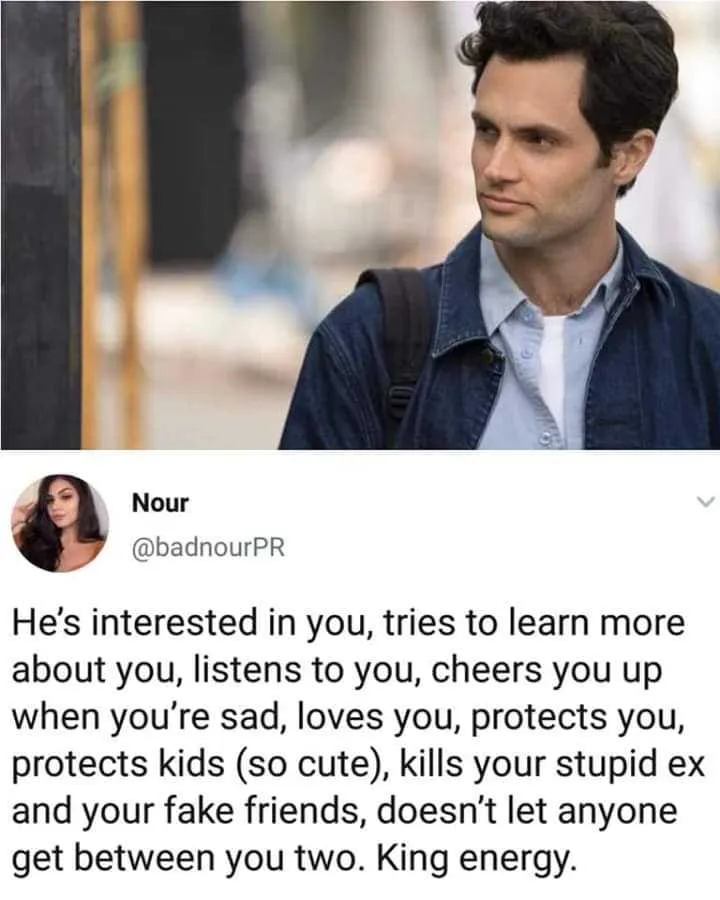
Some people, who also have taken the time to reflect the series, often label the Joe character as a walking talking bag of white male privilege and a shiny, sparkly one because of his looks. Even the actor, Penn Badgley, who played the character pointed out that if the role was played by someone who did not fit the criteria, the viewers wouldn’t vie for it at all [3].
I am partially guilty about this to be honest. I admit that as much as I want to hate Joe and be immune to my own inherent biases to physical attraction or whatever psychological tricks sprinkled around the character, I always most easily find reasons not to.
If I am strictly honest, I also think I wouldn’t feel as conflicted the same way if the role was played by a less attractive male, in fact I think I would be creeped out and run for the hills. Way to go on the double standards department, am I right?
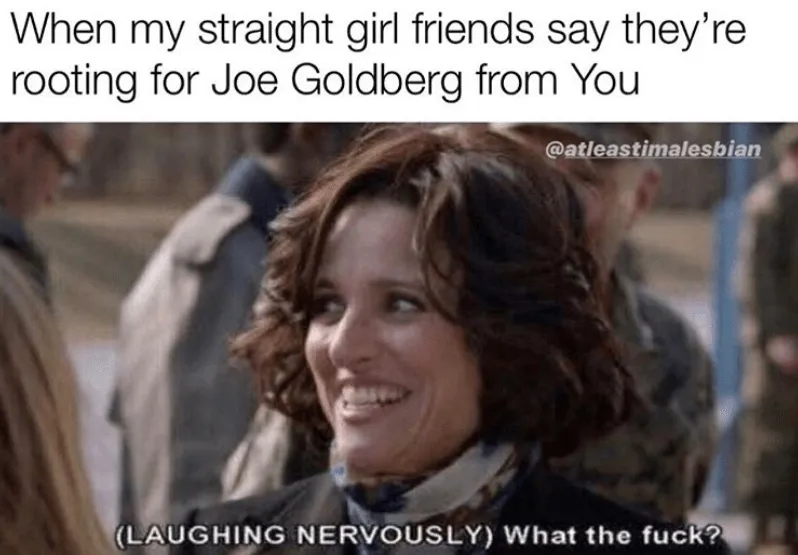
Hey, in my defense, I think this is just how I was socially conditioned when it comes to attraction, and I am pretty sure majority of the people reading this can relate at some level.
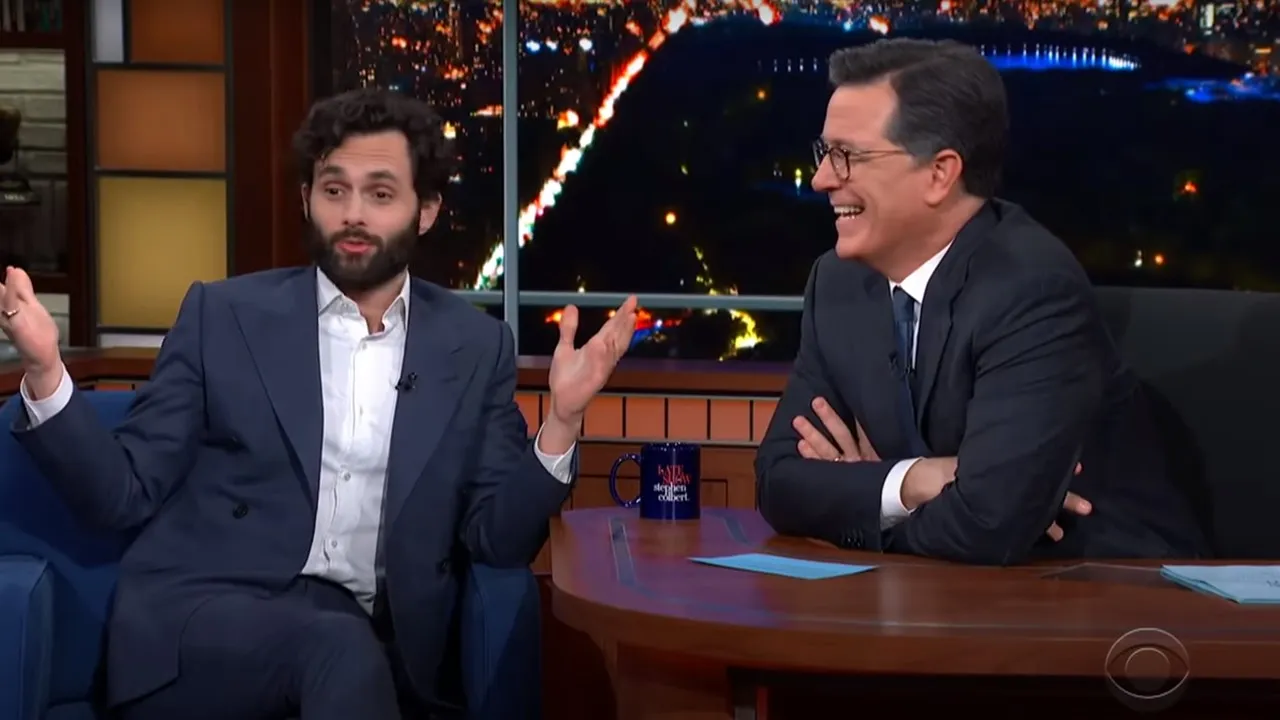
This is probably what Badgley meant in his interview in The Late Night Show With Stephen Colbert when he stated
“how far are you willing to be patient and forgive someone who inhabits a body like mine (Badgley’s), color of his skin (Caucasian), gender (male) and privileges (conventionally attractive; well-educated)”
when he was asked on what he thinks the show says about our society. The show was meant to serve as a social commentary, and for a lot of the “thirsty” tweets from fans Penn Badgley has been getting on social media, that says a lot [4].
What does it mean for us and our sense of morality?
If we were in a functional, more ideal society with these types of double standards brought to a minimum, I would probably #CANCEL the Joe Goldberg character without a hesitation, but instead, I keep coming back to a part in the series where Mr. Mooney tells Joe that maybe, the guy Candace was cheating on him with, deserved to die. “People get killed in wars all the time” says Mooney so what difference does it make when Joe commits one tiny murder?
As much as I want to say that my sense of morality is rigid or concrete and far from fragile (and it IS to a certain socially acceptable extent), I can’t help but wonder if morality is just an established social construct in the first place. It makes me wonder about the dangers of people existing in the world and running around with a malleable sense of morality. Malleable in a sense that they bend the rules to make it suit their own convenience. "Shit. Could I be one of these people?" is maybe one of the questions we need to ask ourselves. Because as I already am nearing the end of this paragraph, there is a possibility that I am in denial of my overactive mind looking for a way to justify a fictional murderer’s wrongdoings.
Know that what is more alarming is, I am a real person compared to Joe Goldberg, I actually exist, and if a real and existing person can introspect and identify that one’s own sense of morality can be easily bended or modified for one’s own benefit, then no wonder why humanity is unconsciously suffering the way it is suffering. Are we just bags of consciousness running around chasing ideals that suit us?
Are we just clenching our eyes shut against some truth we don’t want to face? and yes, I am asking that in Joe's voice.
Where I stand
I have mentioned earlier that there was something in Joe that makes the viewer root for him. In one end of the spectrum, to root for his incarceration, on the other hand, to root for him getting away with his misdeeds. I would like to imagine being asked where I lie in that spectrum.
What will my answer be, you ask?
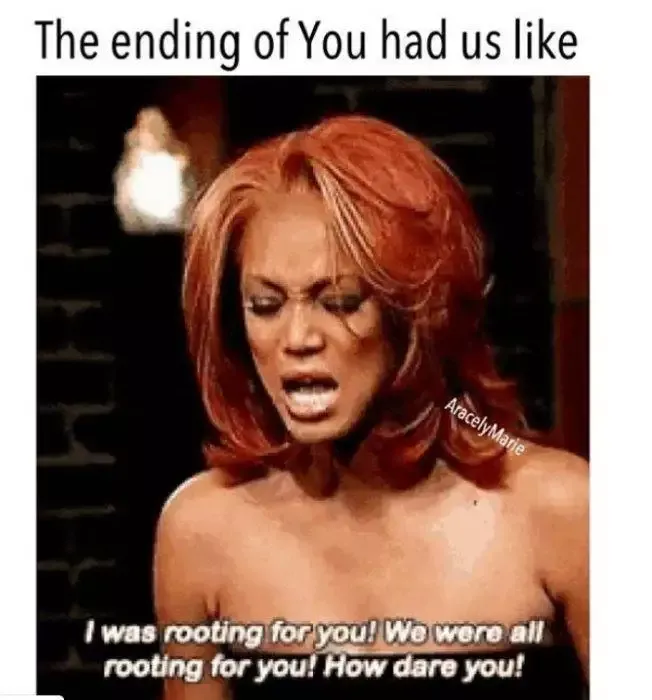
I rooted for Joe and his character development in the beginning. I was patient when he was observing Beck, patient when he was stalking her online, disturbed when he was spying on her outside her house, frustrated when he locked Benji in a cage and then eventually screamed a WTF in my head when he decided that Benji needed to die, but I still sympathized for Joe the whole time.
Funny thing when he killed Benji, it almost seemed like Joe’s actions were justified, because it was shown in the series that Benji also killed another person. It was only because of Benji’s father’s wealth and reputation that Benji wasn’t held accountable.
We are now looking at two people who have killed another human life. As much as I want to feel sorry for Benji because he didn’t intend to kill another human being (unlike Joe), I can’t also help but imagine the pain one family went through because of the person’s death. The other bothersome thing about it is he was not held accountable for it because of Benji having wealthy parents.
I must be honest that I felt conflicted at this part in Season 1. Imagine the many, in human history who have killed another human life in secret and got away with it (whether intentional or not) only because of having the privilege of buying out their punishment. Joe’s entitlement pushes him to kill anyone who he deemed to be in his way of his “perfect” love story, sure, but can the value of human life be really placed on a price tag? I beg to differ. However that does not mean Benji had to die on Joe’s hands either.
I cannot also readily give in to viewing Joe as the chivalrous knight the way he always viewed himself throughout Season 1, because at the end of the day, he is a sick man who has killed Benji, Peach, Ron and a whole lot of others including Beck, who he claimed to be his true love, while he keeps lying to himself in the process.
He stalked, stole and manipulated people to get him nearer to the type of "unconditional" love he is willing to kill for, and when he finally found a woman who actually accepts him for who he is and all his "unconventional" flaws, someone who has the same twisted view of love, someone who has also killed for it, he looks at the lady with more than enough judgement to shatter his fancy glass cage, AND you know what? He almost ended her life if she didn't mention that she was carrying a baby.
Not enough curse words could satisfy me at the last episode. Lagot kaayo ko, and you would be too, to be honest.
As I said earlier, I am not immune to the psychological tricks involved in this show especially since the story plays out in the perspective of the serial killer. In fact it makes me sympathize with the character more despite how shitty the character is, and I guess that's what it takes to create a compelling story.
Sympathizing however, doesn't necessarily equate to supporting the character and his motives.
He does not kill because he likes the act of killing
and that is why I am careful to not label him a monster but I find myself hesitant to describe him as a full human being either.
It’s not because I am denying the capabilities of a full human being to do damage. I think I have lived long enough to witness that humanity is very capable to do all kinds of heinous things and more. And although the team behind the scenes have done a wonderful job creating Joe as the most realistic representation of the creepy nice guy from a female point of view, he is nothing but a caricature – a mere caricature of the nice guy persona being stretched to sinister extremes.
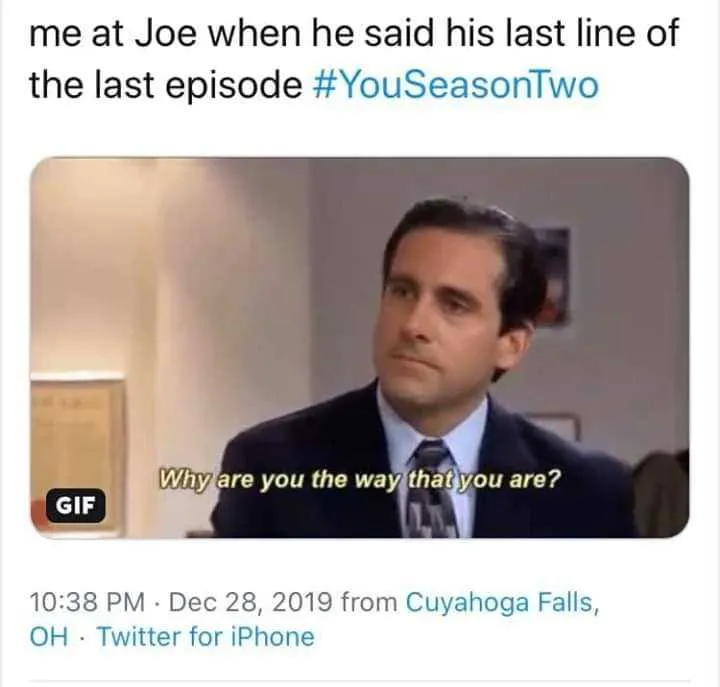
This is partly the reason why I find hoping for redemption on Joe Goldberg, irrefutably futile. To my disappointment, Joe’s limited amount of character development across the series has led me to that conclusion… at least for now.
Kudos to the team who created the absolutely hooking series, You and for Penn Badgley's incredible acting onscreen. I can't wait to stream the third season on Netflix.
Cited Works:
[1] Quora, What kind of mental illness does Joe Goldberg, a character of “You” (Netflix’s TV series), have?, (2020). https://www.quora.com/What-kind-of-mental-illness-does-Joe-Goldberg-the-main-character-of-You-Netflixs-TV-series-have.
[2] T. Grande, Joe Goldberg from “You”|Mental Health & Personality Factors, (2020).  .
.
[3] E. Stanford, What Penn Badgley Wants Us to Learn from “You,” (2019). https://www.nytimes.com/2019/01/24/arts/television/penn-badgley-you-netflix.html.
[4] The Late Night Show with Stephen Colbert, Penn Badgley Can Go From Charming to Creepy Without Changing His Expression, (2020).  .
.
Special thanks to:
Breanna Ahearn on The Funny Beaver for the memes